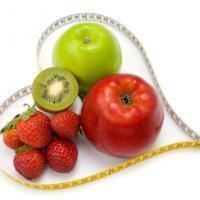Potassium and 7 Great Foods High in Potassium
Potassium, along with sodium and chlorine is one of the three nutrients that a person should consume in large quantities. The potassium content in a human body is 220-250 grams. Most of it is contained in our cells.
Together with chlorine and sodium potassium is involved in regulation of water and salt exchange in our body. It maintains normal balance of tissue and extracellular fluids. Potassium deficiency can cause problems with converting glucose into energy. In this case our muscles will have no source of energy, and will not be able to contract. Such a disorder may even lead to paralysis. Potassium is also involved in regulation of blood pressure and heart rhythm. Potassium is able to fight some forms of depression, improves supply of oxygen to our brain, helps get rid of toxins and even prevents blood-strokes.
The daily potassium need is 3-5 grams. The need for this mineral is increased for people who do sports, who are under great physical and emotional stress, experience excessive sweating, or take drugs (they lead to increased loss of potassium).
Potassium is well absorbed from the intestine, and its excesses are eliminated with urine. In general, potassium is eliminated with urine almost in the same amount as it is consumed.
In the process of boiling potassium is absorbed by water. That is why if the broth is not used, potassium is lost along with it.
Interaction Of Potassium With Other Nutrients
In most physiological processes potassium acts as an antagonist of sodium, therefore, the excessive amount of sodium in the body can be neutralized by introducing additional amounts of potassium. The healthiest ratio of sodium to potassium in our diet is 1:2. On the other hand, lack of magnesium can prevent potassium absorption and lead to its deficiency.
Potassium Deficiency
There are the following signs of potassium deficiency: muscle weakness, spasms, arrhythmia, drowsiness, apathy, poor appetite, nausea, vomiting, swelling and constipation.
Observations have shown that insufficient amount of potassium in the diet of men triples the probability of death from stroke.
Potassium deficiency can be provoked by the diet that mainly consists of foods with high level of preservatives and sodium, as well as excessive amounts of salt and insufficient consumption of fruits and vegetables, which are the main suppliers of potassium. Alcohol abuse also leads to lack of potassium. Caffeine increases potassium removal from our body, so coffee lovers need additional potassium intake. Stress, which leads to increased sodium preservation in our body, can cause potassium deficiency as well.
Dietary Toxicity Of Potassium
Potassium excess may be the result of kidney diseases. Ingesting excessive doses of potassium can lead to experiencing the following symptoms: anemia, paleness, heart disorders, increased urinating, violation of limb sensitivity.
Foods High In Potassium List
1. Dried Apricots
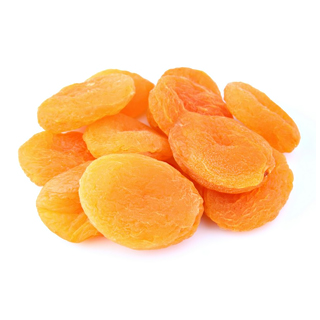
| Apricots, Dried, Sulfured, Uncooked | |
| 100 g | 1 cup, halves (130 g) |
| Potassium: 1162 mg (25% DV) |
Potassium: 1511 mg (32% DV) |
The best dried apricots are those, which were dried naturally in the sun and not treated with any chemicals. Dried apricots contain lots of minerals like iron, magnesium, calcium, phosphorus and organic acids. Essential nutrients present in fresh apricots such as vitamins A, C, PP and some vitamins of group B remain in dried ones as well. Eat 100 grams of dried apricots and you will provide your body with 25% quantity of potassium it needs for a day. Dried apricots are a natural tonic remedy for normalizing cardiovascular system. While using antibiotics, try eating a small portion of dried apricots, it will reduce the negative impact of chemicals on your body. However, consuming large quantities of dried apricots is not recommended, because this product is very high in calories.
2. Beet Greens
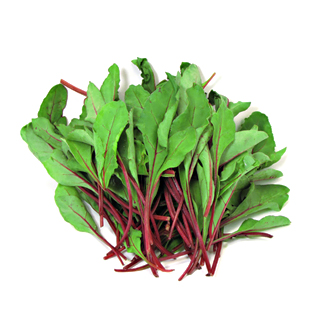
| Beet Greens | |
| 100 g | 1 cup (38 g) |
| Potassium: 762 mg (16% DV) |
Potassium: 290 mg (6% DV) |
Consumption of these crunchy young leaves will help your body to get vitamins A, C, B, B2, D, calcium, phosphorus and iron. Only one cup of boiled beet greens contains 37% of your daily potassium need. Beet greens are used for cooking around the world and can be prepared in a variety of dishes. This tasty and medicinal plant is a remedy against obesity, diabetes, kidney stones and anemia. For cooking, choose only young leaves until they are juicy. Beet greens have been successfully used for decorating dishes. They can even replace the traditionally served lettuce. These greens should be included to any vitamin diet. They can be added to soups and a variety of salads. Beet greens are also an original side dish to pasta or meat.
3. Potatoes
 Types of Potatoes High in Potassium (100g):
Types of Potatoes High in Potassium (100g):
| Potatoes, Baked, Skin, With Salt | |
| 100 g | 1 skin (58 g) |
| Potassium: 573 mg (12% DV) |
Potassium: 332 mg (7% DV) |
If you eat a daily portion of boiled potatoes – 300 grams per day – that will fully provide your body with carbohydrates, potassium and phosphorus. 100 grams of young potatoes contains 20mg of vitamin C. But in the process of storage potatoes lose a large amount of ascorbic acid. These roots are also high in fiber. Potato starch reduces cholesterol in our liver and serum, so it is valued for its antisclerotic properties. Potassium which is contained in potatoes helps to remove excess water from our body (this is important for patients with kidney diseases and people who suffer from alcohol abuse).
4. Spinach
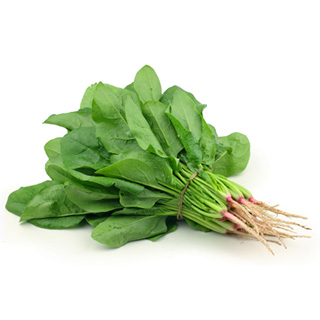
| Spinach | |
| 100 g | 1 bunch (340 g) |
| Potassium: 558 mg (12% DV) |
Potassium: 1897 mg (40% DV) |
Scientific research has confirmed a great variety of spinach health benefits. Its leaves contain vitamins A, C, E, folic acid, and antioxidants, necessary for controlling production of intracellular fluid. A 200 gram serving of these delicious leaves will provide your body with one quarter of your daily potassium value. Spinach is recommended to people who suffer from anemia. Its leaves improve blood-producing function of the body and increase the amount of hemoglobin in our blood. As a low calorie product, spinach can be included to any diet menu. This is very important because people, who want to lose weight, often reduce the quantity of nutrients and weaken their immune system, making it more vulnerable to diseases. Vitamins and minerals contained in spinach help avoid this negative effect.
5. Beets

| Beets | |
| 100 g | 1 beet (2 inch dia) (82 g) |
| Potassium: 325 mg (7% DV) |
Potassium: 267 mg (6% DV) |
Consuming 100 grams of boiled beet roots will ensure that your body gets 10% of its daily need in potassium. Fresh juice made of beets is very beneficial for people who suffer from anemia. Thanks to high content of iodine, beets are useful for the prevention and treatment of atherosclerosis. Beneficial effect of boiled beets on hypertension is caused by high content of magnesium, which helps to lower blood pressure. Fiber and organic acids that are comprised in beets help our digestion processes.
6. Brussels Sprouts
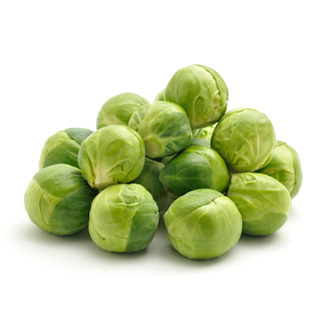
| Brussels Sprouts | |
| 100 g | 1 sprout (19 g) |
| Potassium: 389 mg (8% DV) |
Potassium: 74 mg (2% DV) |
These small sprouts are full of vitamins and minerals. They include vitamins C, B1, B2, B6, and PP, sodium, iron and iodine. A cup of cooked Brussels sprouts includes 15% of your daily potassium need. Due to such high concentrations of amino acids, minerals and vitamins Brussels sprouts are an indispensable component of many healthy diets. The most well-known characteristic of these green veggies is their large content of vitamin C, the main defender of our body during epidemics of influenza and colds. It strengthens the immune system, increases body's resistance and reduces stress and fatigue.
7. Tomatoes
| Tomatoes, Yellow | |
| 100 g | 1 tomato (212 g) |
| Potassium: 258 mg (5% DV) |
Potassium: 547 mg (12% DV) |
In addition to their excellent taste, tomatoes have many useful properties. They contain huge amounts of vitamins, minerals and other substances necessary for our body. The benefits of these vegetables become even stronger in the process of cooking. Tomatoes include fructose and glucose, as well as minerals like magnesium, iodine, zinc, sodium, iron and manganese. Only a cup of fresh and juicy tomatoes will give your body 12% of its daily potassium value.
They also contain the entire collection of vitamins: A, B2, B6, K, PP and E. That is why tomatoes can regulate our nervous system and are an excellent antidepressant.
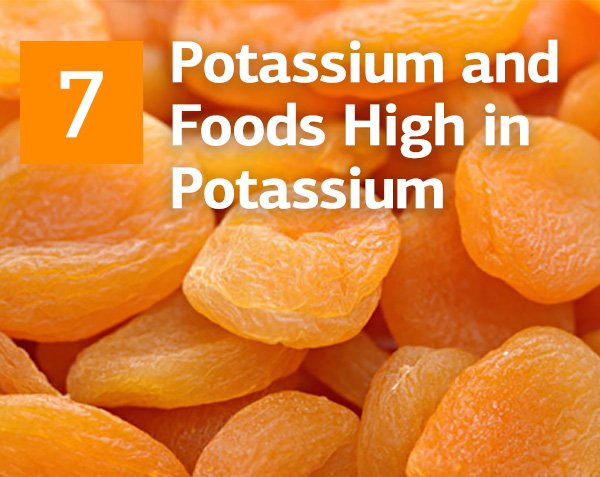
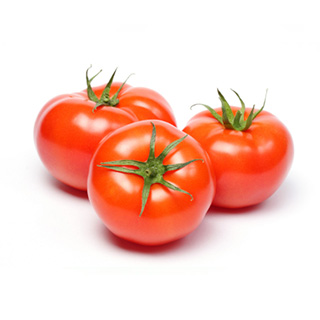 Types of Tomatoes High in Potassium (100g):
Types of Tomatoes High in Potassium (100g):



